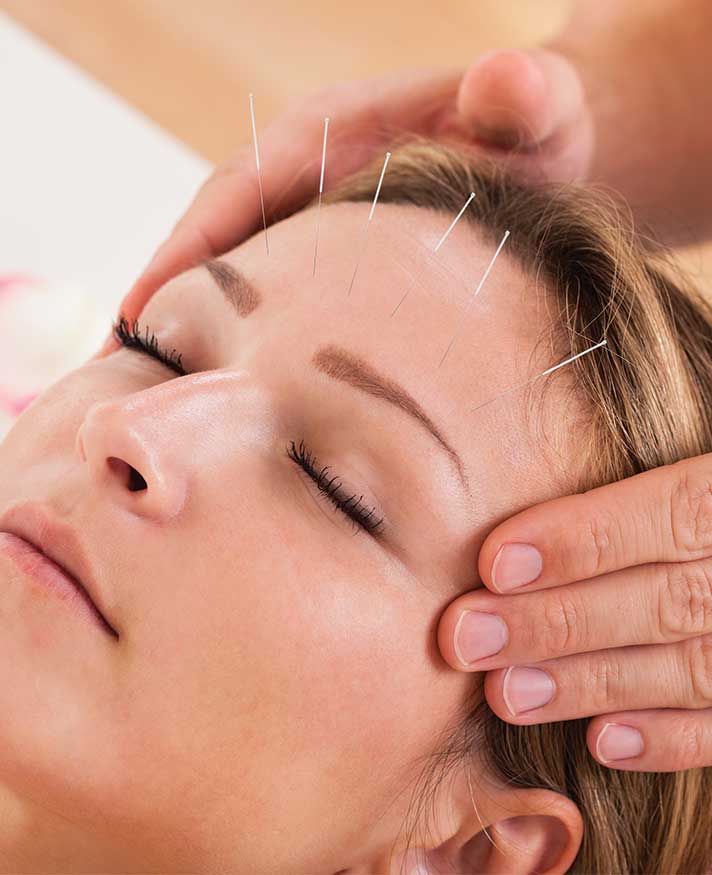Acupuncture for Inflammation

Migraines, with their pulsating pain and disruptive symptoms, cast a shadow over the lives of those who endure their often unpredictable onslaughts. As conventional treatments sometimes fall short of providing complete relief, individuals seek alternative avenues to manage their condition. In recent times, acupuncture, an age-old practice rooted in traditional Chinese medicine, has emerged as a captivating option in the realm of migraine management. The convergence of ancient healing wisdom and modern medical insights has spurred growing curiosity about acupuncture’s potential to offer solace to migraine sufferers.
Understanding Acupuncture for Migraines
Acupuncture for migraines is a therapeutic intervention that involves the insertion of thin needles into specific points on the body to alleviate migraine symptoms. This ancient Chinese practice is based on the concept of Qi, an energy force believed to flow through meridians in the body. According to traditional Chinese medicine principles, disruptions or imbalances in Qi can lead to health issues such as migraines.
Research studies have explored the efficacy of acupuncture as a treatment option for migraines. A systematic review and meta-analysis by Linde et al. (2016) evaluated 22 randomized controlled trials involving over 4,400 participants with chronic migraines. The results showed that acupuncture was associated with a significant reduction in migraine frequency compared to sham acupuncture or no treatment.
The exact mechanisms by which acupuncture may alleviate migraines are still not fully understood. However, several theories have been proposed, including the modulation of neuroendocrine pathways and the release of endogenous opioids and neurotransmitters.
It is important to note that while some studies suggest positive effects of acupuncture for migraines, more high-quality research is needed to establish its long-term effectiveness and compare it with conventional treatments. Additionally, individual responses may vary, and acupuncture should be considered part of a comprehensive approach that includes lifestyle modifications and other evidence-based therapies for managing migraines.
Benefits of Acupuncture for Headaches
Existing research has suggested that a non-pharmacological intervention involving the use of fine needles may potentially provide benefits for individuals experiencing chronic head pain. Acupuncture, an ancient practice originating from traditional Chinese medicine, involves the insertion of thin needles into specific points on the body to stimulate healing and relieve pain. Several studies have investigated the effectiveness of acupuncture in treating headaches, particularly migraines.
How Acupuncture Helps
The mechanism by which this non-pharmacological intervention stimulates healing and relieves pain is still not fully understood. However, there are several theories that attempt to explain how acupuncture helps in the treatment of migraines:
While these mechanisms provide some insight into how acupuncture works for migraines, more research is needed to fully understand its effectiveness.
It is important for individuals considering acupuncture as a treatment option for migraines to consult with qualified healthcare professionals before making any decisions.

Using Acupuncture in Real Life
Implementation of this non-pharmacological intervention in clinical settings has shown promising results in the management of chronic pain conditions. Acupuncture, a traditional Chinese medicine practice, has gained recognition as an adjunct therapy for various health conditions, including migraines.
Real-life implementation of acupuncture involves trained practitioners inserting thin needles into specific points on the body to stimulate nerve pathways and promote healing. Studies have consistently shown that acupuncture can reduce the frequency, duration, and intensity of migraines.
In one randomized controlled trial conducted in a clinical setting, participants receiving true acupuncture experienced a significant reduction in the number of migraine attacks per month compared to those receiving sham acupuncture or no treatment. Another study found that acupuncture was more effective than flunarizine, a commonly used medication for migraine prevention.
Furthermore, real-world experiences reported by patients who have incorporated acupuncture into their migraine management show positive outcomes. Many individuals report decreased reliance on medications and improved quality of life after regular acupuncture sessions.
While more research is needed to fully understand the mechanisms behind acupuncture’s effectiveness and identify specific patient populations that may benefit most from this therapy, its potential as an alternative or complementary approach to managing migraines is promising.
Scientific Evidence for Acupuncture
Numerous clinical trials have investigated the effectiveness of acupuncture for migraines. A review of these studies found that acupuncture was significantly more effective than sham acupuncture or no treatment in reducing migraine frequency and intensity.
The findings suggest that acupuncture may be a valuable adjunctive therapy for managing migraines.
Incorporating Acupuncture into Treatment
When considering the integration of acupuncture into treatment, it is important to evaluate its potential benefits and limitations. Acupuncture has been used as a complementary therapy for various conditions, including migraines. Research suggests that acupuncture may provide some relief for migraine sufferers, although its effectiveness varies among individuals.
The following points highlight the potential benefits and limitations of incorporating acupuncture into treatment:
Acupuncture targets specific points on the body, aiming to restore balance and promote healing. This approach may help alleviate migraines by reducing pain perception and improving overall well-being.
Some studies suggest that acupuncture can reduce the frequency and intensity of migraines, providing long-term relief for patients.
Acupuncture is generally considered safe when performed by trained professionals, with minimal side effects reported.
However, individual responses to acupuncture can vary greatly. While some people experience significant improvements in their migraine symptoms, others may not respond as effectively or at all.
It is important to note that while acupuncture may offer relief from migraines, it should not be viewed as a standalone treatment. It is best utilized as part of a comprehensive approach that includes lifestyle changes, medication management, and other evidence-based interventions.
Risks of Acupuncture for Migraines
The potential risks associated with the integration of acupuncture as a complementary therapy for migraine treatment should be carefully considered. While acupuncture is generally considered safe, there are certain risks that need to be taken into account. One potential risk is infection at the site of needle insertion. Although rare, this can occur if proper sterilization techniques are not followed.
Another risk is injury to internal organs or tissues if the needles are not inserted correctly. However, when performed by a trained and experienced acupuncturist, the likelihood of these complications is minimal.
Additionally, some individuals may experience minor side effects after an acupuncture session. These can include temporary pain or bruising at the needle insertion sites, dizziness, or fatigue. However, these side effects typically resolve on their own within a short period of time.
It is important to note that serious adverse events associated with acupuncture are extremely rare when practiced by qualified professionals following appropriate standards of care. Nonetheless, it is crucial for patients considering acupuncture for migraine treatment to discuss any concerns they may have with their healthcare provider and ensure that they choose a licensed acupuncturist who adheres to strict safety protocols.
Overall, while there are potential risks associated with acupuncture as a complementary therapy for migraines, these risks can be minimized through proper training and adherence to safety guidelines by qualified practitioners.
Frequency of Acupuncture Sessions
Research on the frequency of acupuncture sessions has shown that a higher number of treatments over a shorter period of time may lead to greater improvements in migraine symptoms. Several studies have investigated the optimal frequency and duration of acupuncture sessions for migraine treatment.
A systematic review published in 2016 analyzed 22 randomized controlled trials involving a total of 4985 participants. The review found that frequent acupuncture sessions, such as three times per week for four weeks, were more effective in reducing the frequency and intensity of migraines compared to less frequent sessions.
Another study published in 2018 examined the effects of different frequencies of acupuncture on migraines. The researchers divided participants into three groups: one receiving acupuncture twice per week for eight weeks, another receiving acupuncture once per week for eight weeks, and a control group. The results showed that both acupuncture groups experienced significant reductions in migraine frequency compared to the control group. However, the group receiving twice-weekly treatments had greater improvement than the once-weekly group.
These findings suggest that increasing the frequency of acupuncture sessions can enhance its effectiveness in alleviating migraine symptoms. However, it is important to note that individual responses may vary, and further research is needed to determine the optimal frequency and duration of treatment for each patient.
Acupuncture has shown promising results in the treatment of migraines. The benefits of this ancient practice include reducing the frequency and intensity of headaches, as well as improving overall well-being.
Scientific evidence supports the effectiveness of acupuncture in relieving migraines, although more research is needed to fully understand its mechanisms of action. The philosophy behind acupuncture emphasizes restoring balance and promoting the body’s natural healing abilities.
While the cost of acupuncture treatment can vary, many find it to be a worthwhile investment in their migraine management. Regular sessions are generally recommended for optimal results.
